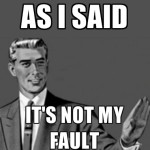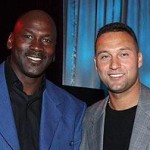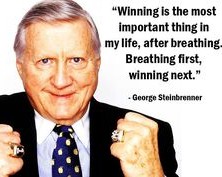If you’re a football fan, then you’re familiar with the classic Bill Parcells quote “You are what your record says you are“. I’ve always loved that line because it means that you can make all the excuses you want, but the result is what’s attached to your brand’s name.
 It comes into play so often too in radio. You have a bad ratings book, and quickly it’s the fault of Nielsen’s PPM system, talent being out sick or on vacation, a lack of marketing, or the competitor having Voltaire. It could never be your fault or the brand’s fault, because that would mean acknowledging your own shortcomings.
It comes into play so often too in radio. You have a bad ratings book, and quickly it’s the fault of Nielsen’s PPM system, talent being out sick or on vacation, a lack of marketing, or the competitor having Voltaire. It could never be your fault or the brand’s fault, because that would mean acknowledging your own shortcomings.
In the radio business, much like the world of sports, companies, stations and people have very different goals. For some brands, anything less than a championship is unacceptable. For others, being relevant, in the game, or better than mediocre is acceptable. Some groups will shake things up quickly if a plan isn’t working, others wait for dinosaurs to return to the planet before they even consider switching gears.
It’s easy to say you’re committed to winning and you’ll do whatever it takes to succeed, but if that mentality doesn’t exist throughout every department inside the organization, it becomes much harder for a brand to have collective success.
 First of all, if winning was easy, everyone would do it. Secondly, while people on the programming end care about connecting with the audience and delivering ratings to justify their impact, promotions and sales people, along with station managers, often look harder at generated revenues/profits and customer satisfaction, than they do the product’s performance.
First of all, if winning was easy, everyone would do it. Secondly, while people on the programming end care about connecting with the audience and delivering ratings to justify their impact, promotions and sales people, along with station managers, often look harder at generated revenues/profits and customer satisfaction, than they do the product’s performance.
The success of your show/brand may help the business end of the operation tell a better story, and that does help them with their demands for higher ad rates, but if the station’s numbers are lower, they still have to paint a great picture, and produce dollars, despite the programming team underperforming.
While we can agree that the job of the business department is to tell a positive story and increase profits for the company, shouldn’t there be higher accountability on the product end too? If sales people are expected to increase profits, and charge higher rates per commercial on a year to year basis, then doesn’t it make sense to expect the programming team to perform better year to year too?
Now some of you may be saying “Don’t put that pressure on us, we’re fine right where we are“, but I don’t think or operate that way. There’s a big difference in the mindset of one who expects to win and consistently challenges themselves, and others who are satisfied with the status quo. You either seek total domination and being the best, or you don’t. It’s that simple.
 Can you imagine Tom Brady, Derek Jeter, Michael Jordan or Wayne Gretzky saying “let’s do what we’ve done before, that should be good enough“? Each of those individuals are driven by their own desire to be great, that no owner, coach, or teammate needs to say anything to light their competitive fire.
Can you imagine Tom Brady, Derek Jeter, Michael Jordan or Wayne Gretzky saying “let’s do what we’ve done before, that should be good enough“? Each of those individuals are driven by their own desire to be great, that no owner, coach, or teammate needs to say anything to light their competitive fire.
It’s what separates a coach like Bill Belichick from Joe Philbin. It’s the difference of owners like Robert Kraft and George Steinbrenner who give their people what they need to succeed, and owners like Jimmy Haslam and Jeffrey Loria who always get in the way. It’s why an athlete like LeBron James continues to improve and excel, and others like Carmelo Anthony showcase talent but never reach a championship level.
Great teams and players rise to the top, and welcome higher expectations and challenges. They want to be tested to show what they’re made of, and nobody puts more pressure on them except themselves.
It’s an easy thing to recognize, and I wonder why more broadcasters and companies don’t notice it themselves.
 If you’re a sports talk radio station, and your ratings are consistently outside the Top 10 with Men 25-54, there should be some concern and a number of questions being asked. Everything should be analyzed from the station’s name, position and lineup, to the content approach, the market’s appetite for sports radio, and nobody should be satisfied unless solutions are provided to help the brand improve.
If you’re a sports talk radio station, and your ratings are consistently outside the Top 10 with Men 25-54, there should be some concern and a number of questions being asked. Everything should be analyzed from the station’s name, position and lineup, to the content approach, the market’s appetite for sports radio, and nobody should be satisfied unless solutions are provided to help the brand improve.
Maybe the signal isn’t strong enough, which means you need to either make the investment to play with the big boys and drive bigger ratings and revenues, or get used to where you are.
Maybe your market isn’t a great fit for the format, and while I hate to see any station flip out of the format, if the audience isn’t going to support it, and you’re going to lose money, then maybe it’s a bad investment.
If it’s your personnel, there’s a simple solution – you change it. Teams change rosters all the time, and if that’s what it takes to lift a brand from 20th place to 5th, then be willing to make those difficult decisions. I don’t like seeing anyone lose an opportunity, but this is a results oriented business, and you can’t let personal feelings get in the way of what helps you maximize your brand’s potential.
Last but not least, if it’s the approach, brand name, or on-air positioning, once again you need to modify it to suit your talent, and the wants and needs of the audience. You can try to force your ideas and style on people, but if they’re rejecting it, you either adjust your game plan, or someone else will do it when they’re sitting in your chair in the future.
 As easy as it is to put the pressure on the shoulders of the on-air talent and programmers, I think pressure equally needs to be placed on corporate managers and ownership. The people up top need to set the tone for what is and isn’t acceptable inside the company. Stock prices rise and decline based on performance, and if goals are laid out and agreed to by each department, and the resources and support are provided to help people do their best work, then they should be able to deliver. If they don’t, then they also need to be held accountable.
As easy as it is to put the pressure on the shoulders of the on-air talent and programmers, I think pressure equally needs to be placed on corporate managers and ownership. The people up top need to set the tone for what is and isn’t acceptable inside the company. Stock prices rise and decline based on performance, and if goals are laid out and agreed to by each department, and the resources and support are provided to help people do their best work, then they should be able to deliver. If they don’t, then they also need to be held accountable.
When I see a sports station sitting in 15th-30th place, for longer than 12-18 months, the competitor in me can’t help but question what’s going on. Remember, this is the ranking with Men 25-54, not all listeners. If you add older/younger people into the equation, along with women, the performance is even worse.
Is this in line with the company’s vision for the brand? Is it acceptable to the company, market manager, programmer, and talent? Are raises being given and contracts renewed for people who work there? If so, what’s the rationale?
I’m all for rewarding good performers, but if you haven’t improved, and the company hasn’t made more money, then why should you receive more? This isn’t a government position where you earn annual increases for time on the job.
If you’re operating this format (which is expensive), and you’re consistently performing 15th or worse with Men 25-54, it’s going to be difficult staying profitable. Maybe you have some national shows on your airwaves which helps you reduce costs, and in the short-term that helps you make a few dollars, but long-term, it’s hard to create a thriving business without a higher performance.
For me it goes back to two questions:
- Are you trying to win, or stay afloat?
- Are you accepting failure/mediocrity or doing whatever it takes to build a winner?
 Great organizations don’t apologize for expecting greatness from their people, and they certainly don’t wait long to make adjustments if the formula isn’t working.
Great organizations don’t apologize for expecting greatness from their people, and they certainly don’t wait long to make adjustments if the formula isn’t working.
If your group and/or people aren’t where they need to be, what are you doing to change the outcome? Maybe you won’t beat your competitor today, but you certainly better be trying, and improving, and your goal better be to overtake them.
It comes down to this, “Are you in it to win it, or just happy to be in the game“?
But what the heck do I know, I’m just a guy who thinks winning isn’t everything, it’s the only thing. Guys like Dan Snyder and James Dolan have certainly proven otherwise.

Jason Barrett is the President and Founder of Barrett Media since the company was created in September 2015. Prior to its arrival, JB served as a sports radio programmer, launching brands such as 95.7 The Game in San Francisco, and 101 ESPN in St. Louis. He also spent time programming SportsTalk 950 in Philadelphia, 590 The Fan KFNS in St. Louis, and ESPN 1340/1390 in Poughkeepsie, NY. Jason also worked on-air and behind the scenes in local radio at 101.5 WPDH, WTBQ 1110AM, and WPYX 106.5. He also spent two years on the national stage, producing radio shows for ESPN Radio in Bristol, CT. Among them included the Dan Patrick Show, and GameNight.
You can find JB on Twitter @SportsRadioPD. He’s also reachable by email at Jason@BarrettMedia.com.









